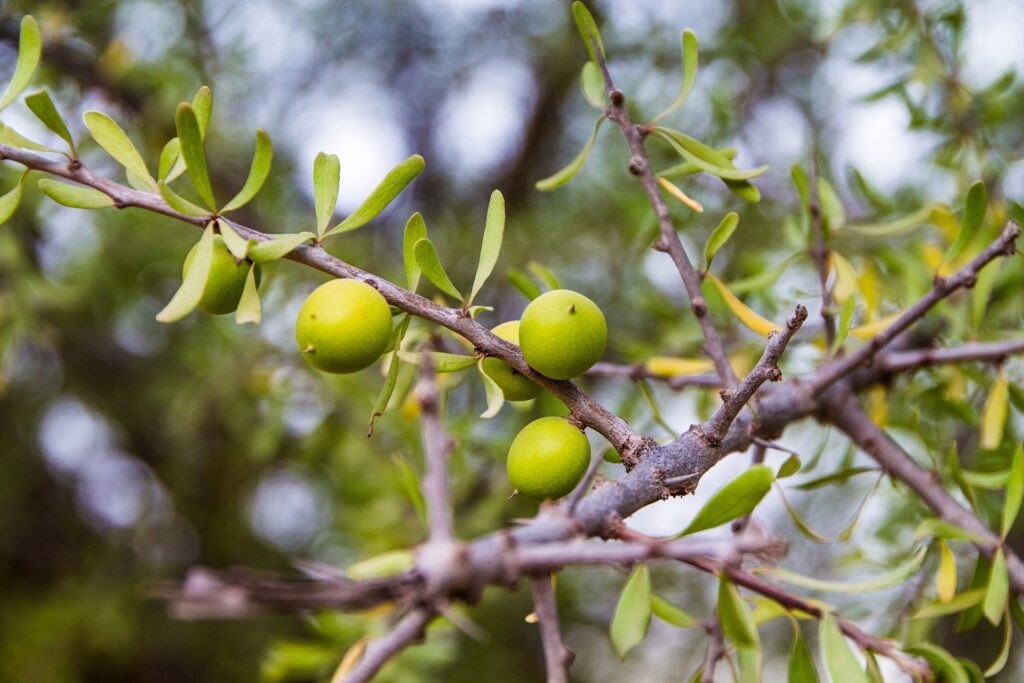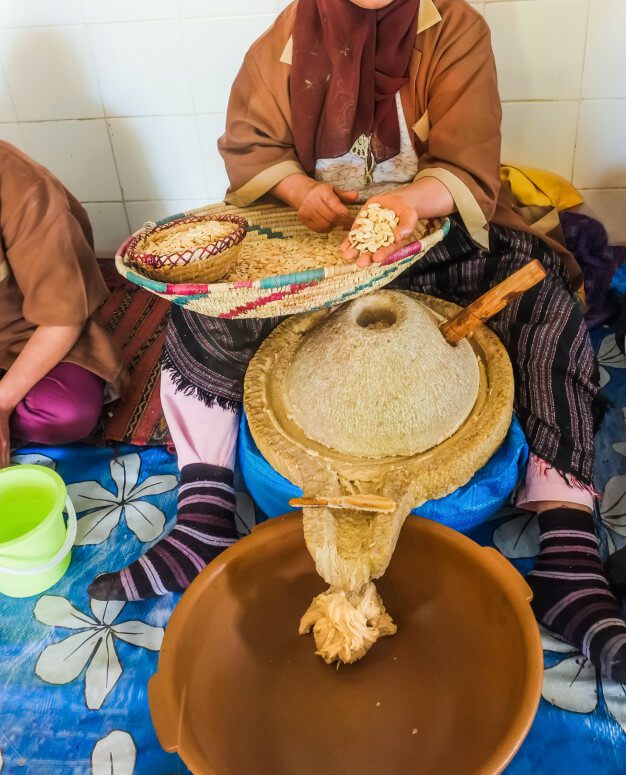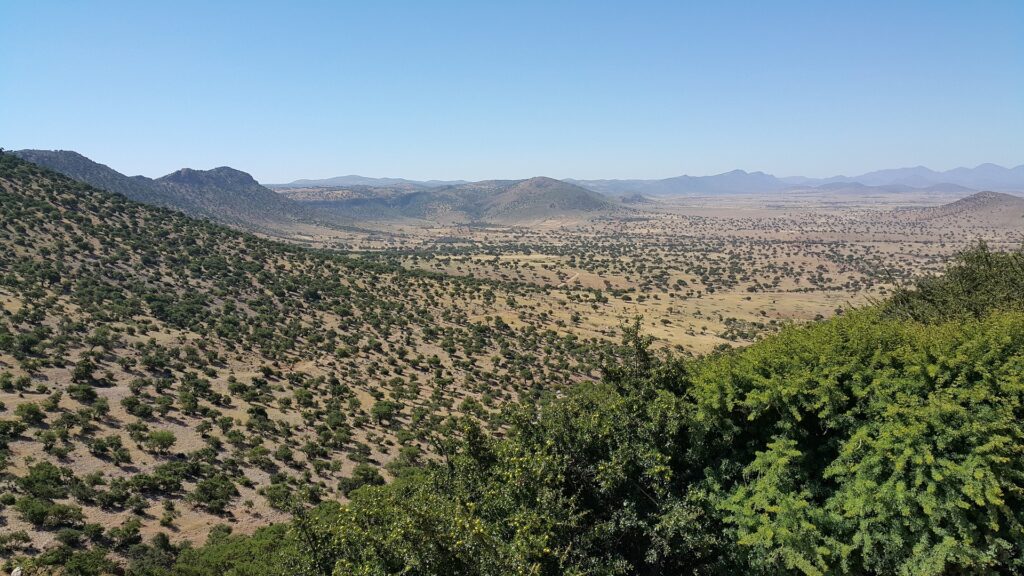Before discussing how Argan Oil impacts Moroccan society, we will first talk about the Argan tree. Argan tree is well recognized worldwide, and Argan oil has become a hot commodity natural skincare product worldwide. Argan tree is one of UNESCO’s world biosphere reserves; besides that, the Moroccan government has put resources in place to safeguard and preserve the Argan forest.

Moroccan government sectors and cooperatives coordinate their effort to support Argan oil production locally. They work with locals and provide much-needed resources that can be put in place to produce this precious argan oil effectively. This is why economic success and the sustainable production of this particular oil have been hugely achieved in recent years.
1. How Argan Oil impacts Moroccan society: Argan Cooperatives
Argan Cooperatives have a significant role in introducing this precious oil to the world, and it is exported to all five continents. This is because Argan oil is world-known for being a luxury cosmetic, medicinal and food product. Its valuable nutritional and medicinal attributes are very valued in the cosmetic industry.
There are so many ways the cooperatives positively affected the Berber women:
- Before joining Argan cooperatives, some Beber women only worked temporary jobs that earned them unsteady income, while some had nothing in their pockets before joining the cooperatives. Before joining the cooperatives, some jobs were herding livestock, fetching, selling eggs, henna painting for marriages/functions, and harvesting and milling wheat. Therefore, Argan cooperatives changed women’s lives hugely by providing a sustainable and dependable income source. Thus, the community members genuinely notice the tremendous value added by the cooperatives to their community.
- Argan cooperatives boost Beber women’s financial status while maintaining their integrity and independence, and therefore, they don’t have to depend entirely on their spouses for financial support.

- Berber women feel empowered and are good role models for other women and girls, especially in a male-dominated society.
- The cooperatives provide Berber women with the proper working conditions while earning a steady monthly income. They even allow some women to work from home to stay with their families.
- There is inequality between women who live in rural communities and those living in urban society regarding education and employment. The cooperatives try to close that gap as much as possible.
- The illiteracy rate among rural women is higher than that of urban. It is one of the challenges Bebebr women living in rural areas face. Most women joining the cooperatives were not confident in using numbers, and some didn’t even know how to calculate a simple calculation. For this reason, many cooperatives provide literacy classes for women and girls. Therefore, they can learn how to read, write, learn math and calculations, and are now more confident in managing their own money, giving them financial independence.
- The cooperatives provide Berber women with the foundation of persistence towards their ultimate goal: to prove their role in society. Thus, these cooperatives help change the stereotype toward rural women’s contributions to the community.
- Argan cooperatives provide women with respect and appreciation and make women’s unity reliable in the community. They can now see themselves as equal members of society while acquiring an understanding of economic independence.
- Berber women depend on cooperatives as a primary source of income and social support for their daily needs. This is because most communities don’t have a sustainable income source. Therefore, cooperatives give Berber women the ability to make and save money to care for their households. This way, they can provide proper shelter, food, and clothes for their families, and their children can now buy school supplies and other necessities.
- Many cooperatives started an ecosystem reforestation project to protect the argan forest and have initiated argan tree nurseries and education programs. This is to create an awareness in the community to understand how valuable argan trees are.
- All income from cooperatives supports struggling community members while maintaining fair trade wages and local communities’ reinvestment.
Argan Oil has become a hot commodity globally and has been in high demand for the last fifteen years. Thus, it has positively affected many sectors of the economy, production, and local communities in the following ways:
- Argan Oil has acquired a very high market value and has become a globally respected cosmetic and high-class cuisine ingredient.
- Its production improves local households’ livelihoods and their family members and provides a much-needed steady income.
- It retails at skyrocketing prices because it has many pharmacological properties and human health benefits.
- Many Argan production companies have implemented the mechanization process to extract Argan Oil because of the high worldwide demand.
2. How Argan Impacts Ecological system In Morocco
- They help fight the expansion of desert and desertification.
- They keep the soil intact and well-protected from disintegration.
- They protect against soil erosion, especially in a semi-dry climate.
- They maintain much-needed moisture for plants to grow in dry regions.
- They help maintain soil fertility and productivity as their roots reach 30 meters deep. The origins of Argan trees are a vital water source for soil, especially in hot climates.
3. How Argan Oil Impact Morocco Socially and Economically
Argan Oil has become a hot commodity in global markets and is in very high demand while gaining well-deserved international recognition. Therefore, the European Union and the Moroccan authorities formed women-led cooperatives to support local communities to create a lifelong income source while sustaining Argan Oil production to meet the world’s demand.
For the above reason, the Argan Oil business has played a vital role in alleviating poverty, to some degree, in some communities in recent years. This is because it provides much-needed economic and social benefits to rural communities, especially Berber women.
4. Environmental Impact of Argan Oil:
We all know that forest degradation is happening globally, which affects the country’s economy and communities.
In Morocco, some of the factors that lead to forest degradation are:
- Climate change.
- Timber extraction.
- The overuse of resources.
- Mining and dam construction.
- Other infrastructure development.
- The expansion of agriculture and rangelands.
- Urbanization as people relocate from rural areas to urban.

Even if Argan trees maintain excellent adaptation to drought and other severe environmental conditions, degradation factors still affect the Argan forest.
These factors include:
- Shortage of water.
- Water resource scarcity.
- Low rainfall and hot, dry weather.
- Harsh winds that lead to soil erosion.
- Repetitive drought and high temperature
- Too much cut-down of Argan trees to be used for fuel or timber.
- Goats spend too much time grazing the Argan trees because there is a shortage of feed on the ground.
Fatty Acid, Phytosterol, Tocopherol, and Volatile Compounds Composition
The most important component in vegetables is the fatty acid. It is notable that fatty acids are largely dependent on their composition. Argan is a vegetable oil with approximately 90% unsaturated fatty acids, but contains just approximately 19 grams / 100g saturated fatty acids. Unsaturated fat is known in nutrition as a valuable nutritive resource for reducing inflammation in children. Olenic acid (43-49 g/100g) and Linoleic acid (29-37 g/100g) are important unsaturated fatty acids that exist in Argan Oil.
Argan oil benefits
Hydrates and Moisturizes the Skin: Argan oil is rich in fatty acids, antioxidants, and vitamins that deeply hydrate and moisturize the skin, leaving it soft, smooth, and glowing.
Reduces Fine Lines and Wrinkles: The antioxidants in argan oil help protect the skin from free radicals, which can cause premature aging, such as fine lines and wrinkles.
Heals Acne and Other Skin Conditions: Argan oil is a natural anti-inflammatory and has been found to be effective in treating acne and other skin conditions, such as eczema and psoriasis.
Improves Skin Tone and Texture: Argan oil is known for its ability to improve the skin’s tone and texture, reducing the appearance of dark spots and scars.
Protects Against Sun Damage: Argan oil contains vitamin E, which acts as a natural sunscreen, protecting the skin from harmful UV rays and sun damage.
Strengthens Nails and Hair: Argan oil is also great for strengthening nails and hair, helping to prevent breakage and promoting healthy growth.
Reduces Razor Burn and Irritation: Applying argan oil after shaving can help reduce razor burn and irritation, leaving the skin smooth and silky.
100% Natural and Safe: Argan oil is a natural and safe product, free from harsh chemicals and synthetic ingredients, making it an ideal alternative for those looking for a more natural approach to skincare.
Composition of argan oil
The composition of argan oil is as follows:
Fatty acids: Argan oil is rich in oleic acid, palmitic acid, and linoleic acid, which help to keep skin and hair moisturized, smooth, and healthy.
Vitamins: Argan oil contains high levels of vitamin E, a powerful antioxidant that helps to protect the skin from damaging free radicals. It also contains vitamin A, which helps to stimulate cell growth and repair, and vitamin F, which helps to maintain skin elasticity.
Antioxidants: Argan oil contains a variety of antioxidants, including phenolic compounds, carotenoids, and tocopherols, which help to protect the skin from damage caused by environmental factors, such as UV rays and pollution.
Sterols: Argan oil also contains high levels of plant sterols, which help to reduce inflammation, support skin healing, and enhance the skin’s natural barrier function.
Polyphenols: Argan oil is rich in polyphenols, which are powerful antioxidants that help to protect the skin from environmental damage and promote healthy skin aging.
Overall, argan oil is a highly nourishing and beneficial oil that is renowned for its moisturizing and rejuvenating effects on the skin and hair.
Frequently Asked Questions
Is it good to use argan oil every day?
Argan oils are a fantastic addition in our skincare routine because they provide moisturizing properties throughout the day and night. Using argan oil regularly can reduce sebum levels, reducing blemishes in dry, oily areas. you can use this pure argan oil as an alternative to olive oil.
Does argan oil stimulate hair growth?
Agricultural oils contain phenols. They strengthen hair follicles and stimulate cell production in hair. The vitamin A found inside this oil helps promote healthy skin scalps, thereby encouraging hair growth, and it also increases the density of the hair strands.
What is the effect of argan oil on hair?
Argan Oil moisturizes and protects my head against daily damage. In the long term, Argan oil helps reduce breakages, split strands and improve the scalp.
What is cosmetic argan oil?
Cosmetic argan oil is a type of oil derived from the kernels of the argan tree, native to Morocco. This cosmetic argan oil is known for its nourishing and moisturizing properties and is commonly used in beauty and skincare products such as face creams, serums, shampoos, and body lotions. It is rich in antioxidants, vitamins, and essential fatty acids that can help improve skin and hair health.
What is the difference between olive oil and argan oil?
Olive oil is a staple in Mediterranean cooking and is extracted from olives while argan oil is produced from the nuts of the argan tree, which is native to Morocco. Olive oil is commonly used for cooking and as a dressing for salads, while argan oil is used mainly for its cosmetic and skincare benefits. Olive oil has a rich, slightly bitter taste and is high in healthy monounsaturated fats, while argan oil has a nutty, slightly sweet flavor and is rich in antioxidants, vitamins, and minerals. Both oils are considered healthy, but the specific benefits will depend on the type and quality of oil used.
What is an argan tree and where does it grow?
The Argan tree (Argania spinosa) is a species of tree native to Morocco. It grows mainly in the southwestern region of the country in the arid Souss-Massa-Drâa area. This slow-growing tree can live up to 200 years and is known for its unique nuts that are used to produce argan oil.
What is the difference between argan oil and essential oil?
Argan oil is a type of vegetable oil derived from the nuts of the argan tree that grows in Morocco. It is commonly used for skin and hair care due to its moisturizing and nourishing properties. Essential oils, on the other hand, are highly concentrated plant extracts that are used for their fragrance, flavour, and therapeutic benefits. Essential oils are often used for aromatherapy, massage, and as a natural remedy for various health issues. Argan oil is not an essential oil and should not be used in the same way, as it is a carrier oil that is used to dilute essential oils before applying them to the skin.

